|
Xishi (7th Century BC-6th Century BC) was so entrancingly beautiful that fish would forget to swim and sink down when she walks by.
Wang Zhaojun (1st Century BC) was so beautiful that her appearance would attract the flying wild goose to fall from the sky.
Diaochan (3rd Century AD) was so pretty that the moon itself would shy away in embarrassment when compared to her face.
Concubine Yang Yuhuan (719-756AD) could make blooming flowers feel ashamed.
Xishi (497 BC) was a legendary beauty of ancient China. She has been described as "equally charming in both heavy and light makeup", "as appealing when she frowns as when
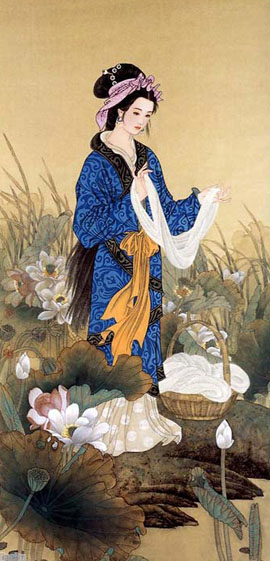 she smiles". Of her figure it has been said that "were she plump,
you would admire her plumpness, were she thin you would admire her for
being slender". She is celebrated as a woman of extraordinary natural
beauty with a universal appeal. Although many have praised Xishi's looks,
there is but little mention of her notable virtue - she had a great love
for her country and her people.
she smiles". Of her figure it has been said that "were she plump,
you would admire her plumpness, were she thin you would admire her for
being slender". She is celebrated as a woman of extraordinary natural
beauty with a universal appeal. Although many have praised Xishi's looks,
there is but little mention of her notable virtue - she had a great love
for her country and her people. Xishi was the daughter of a tea trader from Ningluo Mountain village in the Zhuji County in Zhejiang Province. This comprised a part of the ancient state of Yue.
When the state of Yue was vanquished by the state of Wu, the King of Yue, Gou Jian was forced to serve the Prince of Wu for three years. After his release, King Gou Jian slept on brushwood and drank gall before each meal to remind himself of the humiliation his country had suffered. He commissioned men to search far and wide for a woman whom he could send as a tribute to Prince Fuchai of Wu. Xishi, whose beauty was much talked of even from early childhood, was selected for this task and sent to the capital.
King Gou Jian approved of the choice and had Xishi dressed in fine robes. He had her trained in royal court etiquette. Gou Jian ordered his minister Fan Li to take Xishi to the Prince of Wu as a tribute gift from Yue. During the journey, Xishi fell deeply in love with the wise minister. Fan Li also grew to admire this courageous lady who was willing to give her life for her country. Consequently, before they parted, they made a secret pledge of undying love.
They arrived at the capital of Wu and the prince welcomed Xishi with open arms. He was enchanted by her appearance and doted on her. Gradually he began to neglect his political duties, preferring to idle away his time with Xishi. He frequently took her out on carriage rides to the noisy and prosperous sections of the city. On these rides, he liked to boast to those around him that he had won the heart of the most beautiful woman in the world. He would add: "If you want to look at her, you'll have to present me with some gold coins!" In this way, he also managed to enrich his coffers.
Xishi, however, never lost sight of her mission. Her aim was to bewitch the Prince of Wu so that his subjects would grow restless and his friends would desert him. The political chaos that ensued would enable the King of Yue to invade the state of Wu, recompensing him for his former humiliation.
Heaven grants the wishes of men. The King of Yue finally annexed the state of Wu. Following the death of Prince Fuchai of Wu, Xishi disappeared from public life. She lived in relative obscurity with Fan Li who became a successful trader.
This story is unique in the history of feudal China as no one has ever found fault with Xishi, even though she had caused the downfall of the state of Wu.
Wang Zhaojun was one of the four China’s ancient beauties. Like her peers, her fame was also tied to the political development of her time. Today, the name of Zhaojun not only symbolizes physical beauty, but also a spirit of goodwill to bridge different cultures, even at the expense of one’s own interests. Her name was Qiang, her style Zhaojun but during the Jin Dynasty, she was referred to as Mingfei as the name Zhao could not be used by ordinary folks since the King Sima Zhao had the same surname. Later generations, however, addressed her as Mingfei.
A native of Zigui (in Western Hubei Province), she entered the imperial court during the reign of Emperor Yuan of Western Han (48-33 BC).During the reign of the Han emperor Xuan (91-49BC), the Huns, or Xiong-Nu, Han’s troublesome northern neighbor, split into five kingdoms, each led by a chieftain known as Chan-Yu. Wars started among the five Chan-Yus in a bid for control. Chan-Yu Khukhenye, who was defeated by his brother Chan-Yu Zhizhi-Guduhu, decided to befriend the former foe in the south, Emperor Xuan, by suggesting that he pay the emperor a personal visit.
Khukhenye was the first Chan-Yu that ever came to pay tribute to a Han emperor. Rejoiced and feeling a bit flattered,
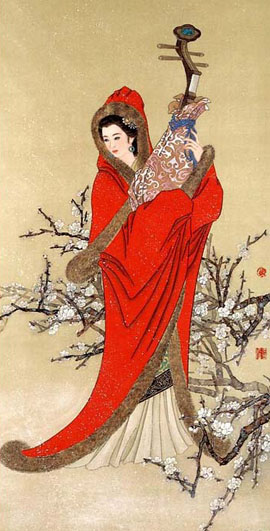 Emperor Xuan went out of his way to meet Khukhenye at the suburb of Capital
Chang’an and held a grand banquet in his honor. After a month’s stay in
Chang’an, Khukhenye thought of going back home and asked Emperor Xuan
for help. The emperor sent an army of ten thousand strong to escort him
back and gave him a hundred thousand bushels of food to bring back to
his starved people. The thankful Khukhenye was determined to maintain
the friendly relationship with the Han Dynasty.
Emperor Xuan went out of his way to meet Khukhenye at the suburb of Capital
Chang’an and held a grand banquet in his honor. After a month’s stay in
Chang’an, Khukhenye thought of going back home and asked Emperor Xuan
for help. The emperor sent an army of ten thousand strong to escort him
back and gave him a hundred thousand bushels of food to bring back to
his starved people. The thankful Khukhenye was determined to maintain
the friendly relationship with the Han Dynasty. After Emperor Xuan’s death, his son succeeded the throne and became Emperor Yuan. Meanwhile, Chan-Yu Zhizhi-Guduhu had been running over the states to the west of Han and went so far as to slay the envoy of the Han emperor. This act of brutality incurred the emperor’s retaliations and cost his own life. With the death of Chan-Yu Zhizhi-Guduhu, Khukhenye’s position was further strengthened. In the year of 33AD, he paid a second visit to the Han’s capital, where he asked to marry one of Emperor Yuan’s daughters to cement the relations of Han and his Xiong-Nu state. The emperor granted his request, but instead of his daughter, the bride would be a maid of honor. Getting married would be a god-sent opportunity for a maid of honor to be freed from their perpetual solitude in the backyard of the palace. However, all but one volunteered to venture in to a matrimony that would destine their life in a foreign land. That was Wang Qiang, better known in history as Wang Zhaojun. She was extremely beautiful and intelligent. At the wedding in Chang’an, the emperor was awed by Zhaojun’s beauty.
Back to his chamber, Emperor Yuan was very regretful that he allowed Wang Zhaojun to be married to the Xiong-Nu chieftain. He would have had her as his concubine if he had known she was so glamorous. He wondered why he had not seen her portrait and sent for it for a review. Incidentally, emperors chose their concubines by looking at portraits instead of the girls themselves. When he found that the portrait did not match Wang Zhaojun, he launched an investigation. It turned out that the artist Mao Yanshou would paint a prettier portrait for those who bribed him or vice versa. As Wang Zhaojun refused to do so, he did injustice to her beauty so that the emperor would never know her existence in the palace. In rage, Emperor Yuan had Mao Yanshou executed.
Regretful as he was, Emperor Yuan blessed the inter-racial marriage. He admired Zhaojun’s courage and was thankful for her willingness to serve the interests of Han in spite of her own.
Escorted by officials sent by the emperor, Wang Zhaojun embarked on a long journey to the north on horseback. They braved bitter cold and heavy snow storms and finally reached Xiong-Nu. There Khukhenye conferred the title of Peaceful Hu-E-Shi, in the hope that she would bring them security and peach. That she did by persuading Khukhenye to abandon violence. As a result, peace reigned on the border with her mother country for over half a century. After Khukhenye’s death, Zhaojun married the eldest son of his and his concubine in accordance with the custom of the Xiong-Nu nationality – a custom abhorred by the Chinese moral norms in which she was brought up. Therefore, it must have taken a lot of courage and political insight for her to do so. It has been popularly believed that she did so for the sake of Xiong-Nu’s stability, and thereby peace between Xiong Nu and her mother country. For her self-sacrifice a second time, she earned the respect of her compatriots not only in her generation, but generations to come.
Diao Chan is allegedly one of the four ancient Chinese beauties. Despite her absence in historical records, she was immortalized as a heroine by the well-known Chinese literary classics Romance of Three Kingdoms.
Some scholars claim that Diao Chan was born in the family of Ren in the Mu'er Village of Bingzhou county of today's Shanxi province. At fifteen, she was selected as a maid of honor in the Han Court, where she was charged with the duty of taking care of court officials’ hat decorations known as Diao Chan at the time. Hence she came to be known as such.
With the death of the Han emperor Ling in 189 A.D., the Han Dynasty fell apart so that warlords ran rampant. The situation would not be stabilized until three of the warlords emerged to become equally strong and began the period of stalemate known in history as the Three Kingdoms. However, before this could happen, chaos reigned. Each warlord had tried to beat the others. In doing so, they needed to rally support with imperial mandate. The court now rendered powerless, thus fell victim to their bloody conflicts trying to get hold of it.
One of the warlords, Dong Zhuo, with the help of his god-son Lü Bu, an invincible young warrior, eventually got the upper hand by slaying the child emperor and installed one of his likings. Though a prime minister in ink, he was in fact a sovereign, and an extremely brutal one! He would kill any of his subjects who dared to voice the slightest dissent. He had a palace built miles outside the capital for himself. In order to get eight hundred maids of honor and concubines, he had all the men related to the women
 slaughtered.
Even the puppet emperor hated Dong and secretly pleaded help of his closest
courtiers.
slaughtered.
Even the puppet emperor hated Dong and secretly pleaded help of his closest
courtiers. Wang Yun, one of the courtiers that the young emperor had consulted, would very much like Dong Zhuo to be destroyed himself. However, with Lü Bu as Dong's body guard in all weather, who could beat this formidable foe and save the dynasty from his deadly grip? He began to lose sleep and appetite, trying to find an answer. His decline in health worried a girl very much. This is Diao Chan. When the Han Dynasty fell apart, she lost her job and was adopted by Wang Yun and worked for him as an alme - a singing and dancing girl. Wang Yun treated her as his own daughter, for which she was very grateful. One night, Diao Chan came out to the garden in Wang's mansion and prayed to the goddess of moon, to whom she expressed her willingness to do whatever she could to help her fatherly master. Her pray was overheard by Wang Yun who happened to come to the garden for a walk. A plan dawned upon him: using Diao Chan to antagonize Dong Zhuo and Lü Bu so that they would become vulnerable. Diao Chan agreed.
The next day, Wang Yun entertained Lü Bu in his mansion, where he introduced him to Diao Chan. Lü Bu was immediately captivated by her beauty and was only too happy when Wang Yun offered to marry them in a few days. A day later, Wang Yun played the same trick on Dong Zhuo. Lascivious as he was, Dong could not wait and took Diao Chan with him as he left Wang Yun's mansion. Whenever there was a chance, Diao Chan would complain of Lü's harassment before Dong, and her resentment of Dong for nabbing their love before Lü. In so doing, Diao Chan successfully drove a wedge between the father and the son, whose jealousy eventually grew into hatred. One day Dong Zhuo caught Lü Bu courting Diao Chan in his own backyard and became so enraged that he ran after Lü with an attempt to kill him. In turn, Lü Bu would have ended Dong's life but for the qualm of the sin of patricide. He finally made up his mind after Wang Yun reminded him that since he and Dong had different family names, they were not legally bounded. Then, they staged a coup d'etat and killed Dong Zhuo, to the happy release of the dynasty.
Some legends told more stories about Diao Chan's heroism. After Lü Bu's death, Cao Cao, another warlord who later established Wei, one of the Three Kingdoms, gave Diao Chan to Guan Yu, one of the two sworn brotherly generals of Cao Cao's rival Liu Bei. Unwilling to sabotage the cause of Liu Bei for whom she had great respect, Diao Chan threatened with suicide. With her consent, Guan Yu escorted her to a temple, where she became a nun. Hearing this, Cao Cao was very angry and ordered that she be captured. His men traced Diao Chan to the temple. Refusing to be brought back to Cao Cao, Diao Chan threw herself to the sword in the hand of one of the men and killed herself.
Another legend tells that the three brother warriors of Liu Bei, Guan Yu and Zhang Fei kept Diao Chan as their sister and sent her back to her hometown after they succeeded in establishing Shu, one of the Three Kingdoms. Diao Chan died a natural death where she was born.
Concubine Yang Yuhuan (713 — 756AD) is known as one of the four ancient Chinese beauties. Like the other three, Yuhuan was a historical as well as a legendary figure. Historically, Yang Yuhuan was the wife of Prince Shou, the son of Xuanzong Emperor of the Tang dynasty. Coveting her beauty, Xuanzong Emperor wanted to have her as his concubine. As he could not openly marry his daughter-in-law, he did it in a devious way. He first made Yang Yuhuan a Taoist nun. Then he gave her the title of Yang the Supreme Truth, which entitled her to become a member of his court. Soon, in 745AD, Xuanzong Emperor conferred the title of Guifei (First Lady) to Yuhuan, making her his most favorite woman in the court to the dismay of hundreds of his other concubines.
Normally, an emperor would not care about a serious love affair for a concubine. Emperor Xuanzong's affection for Concubine Yang, however, was exceptional. Guifei Yang , too, was very much in love with Emperor Xuangzong, and the two became inseparable. Their romance earned admiration from generations to come, but at the time incurred strong disapproval from the emperor's subordinates. Consequently, as the pair fled from a rebel army, Concubine Yang was forced to hang herself. The love affair, culminated with its tragic end, has since become a legend. Among many of the legends, the poem “Lament of Endless Grief” written by Bai Juyi, one of the greatest Tang poets, was the most popular.
The poem began with the lascivious Xuanzong Emperor searching for a beautiful woman to add to the cohort of his concubines. Finally Yang Yuhuan caught his attention. The poet thus described what happened next:
The emperor’s favors also extended to her relatives: her cousin Yang Guozhong, in particular, was appointed prime minister. A wicked person, he made many an enemy in and outside the court.
Xuanzong Emperor and Concubine Yang were both artistically minded, the former well versed in musical instruments; the latter, in singing and dancing. Together they often performed the then famous Rainbow Feather Garment Dance. However, good times did not last. Xuanzong Emperor was
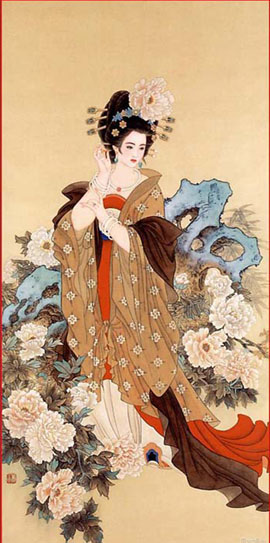 indulging himself in the infatuation with Concubine Yang when civil war
broke out on the frontiers.
indulging himself in the infatuation with Concubine Yang when civil war
broke out on the frontiers.In the first decade of the sixth century, the Tang government established many fortresses, known as fan towns, in the northern frontiers to enforce their defense and conferred the title of jiedushi (military governor) to their top leaders, who were thus entitled to tremendous military, civil and financial powers.
In 755AD, a military officer named An Lushan became so powerful that he began to challenge the sovereignty of Xuanzong Emperor. He led a rebellion under the banner of ending the corrupt government of Prime Minister Yang Guozhong, Guifei Yang’s cousin. When the rebel army marched towards Chang'an, the capital, Xuanzong Emperor had to flee with his courtiers, escorted by an army. When they reached a village called Mawei Slope, a little more than a hundred li from the capital, the soldiers and their officers refused to move on. They demanded that the Prime Minister Yang Guozhong and his cousin Yang Concubine be eliminated, blaming them for the problems that had beset the dynasty.
The Emperor Xuanzong had but to give in to their demand, even though he loved Guifei Yang dearly and knew that she was made the scapegoat for the Prime Minister's misdeeds. After all, his life and, by its extension, the fate of the dynasty was more important than that of a woman. Concubine Yang was also aware of what had happened. Grief and sorrow almost overtook her. She did not grudge her life as much as amorous relations she had with her regal lover. With much reluctance, she hanged herself with a white scarf. Almighty and affectionate as he was, the emperor could not prevent the tragedy. Covering his face with his hands, he allowed his tears to run unchecked.
The rebellion was finally crushed and Xuanzong Emperor returned to his palace. Now that Concubine Yang had gone forever, he had nothing on his mind but her memory. Everything he saw and touched would remind him of their moments together. The lotus roots of the lake resembled her fair skin and the willow branches her eyebrows.
The emperor became listless and sleepless. Even though he was able to fall asleep, the absence of his beloved concubine in his dream gave him more misery than insomnia. Seeing that the emperor suffered so much from the death of Concubine Yang, a Taoist priest offered to help; he claimed that he could communicate with the deceased. He began to search for the spirit of Concubine Yang in heaven and the underworld. Eventually, they traced her to a divine island, upon which there stood pavilions after pavilions populated with nymphs and fairies. Concubine Yang was the most beautiful of them all. At the arrival of her royal lover’s envoy, she hastened out of her chamber without much hairdo. Still she was as beautiful as when she had done the Rainbow and Feather Garment Dance. With tears, she expressed her thanks to the envoy for bringing her the love from the emperor. “Please tell his majesty. Though life is short in the mortal world, it is timeless on this divine island. Give this half of my hairpin to my beloved and let him know of my love for him: it is as firm as the gold of which it is made.”
On each seventh day of the seventh month, Xuanzong Emperor would visit the Longevity Temple, where he could communicate quietly with his First Lady. He would pray, “May we be twin birds flying side by side in heaven and twin trees intertwined on the earth.”
Alas, "heaven and earth may not last forever, but this sorrow is eternal," lamented Bai Juyi at the end of his poem.
The Four Ancient Chinese Great Beauties Silk Scrolls on sale
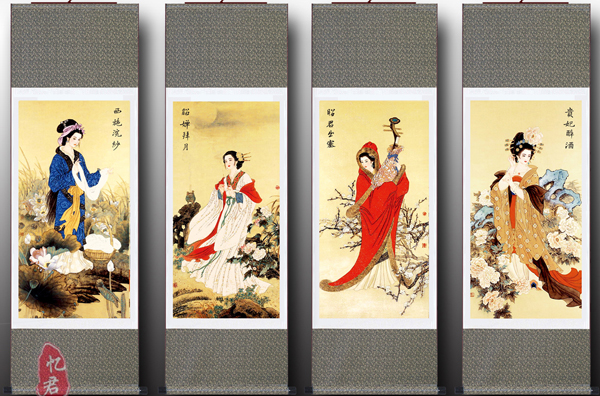 |
Four
Ancient Great Beauties of China Silk Scroll |
There are two types of silk scrolls with four beauties. For the smaller type, the center of the single scroll is 23cm wideX45cm high and the whole single scroll is 30cm wide X100cm high. For the bigger type, the center of the single scroll is 34cm wide X65cm high. The whole single scroll is 45cm wide X140cm high. One set of bigger four beauties scroll costs 200USD including shipping to your door by EMS. One set of smaller four beauties scroll costs 150USD including shipping to your door by EMS. If you have interest please contact me.
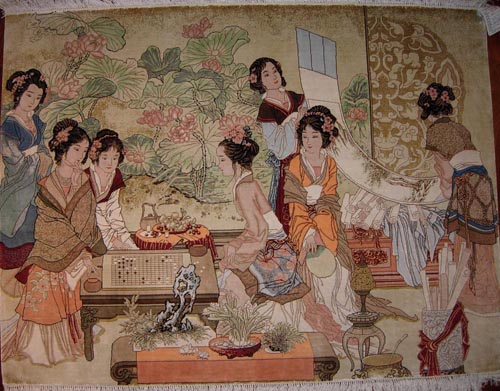 |
| Chinese
Ancient Ladies Silk Wall Hanging |
Please go to this link
to see more information if you have interest in this silk wall hanging.
http://www.chinasilkcarpet.com/tpk_a.htm
Mobile:(+86-1350 110 3837) Wechat:(13501103837) E-mail: chinasilkrug@msn.com